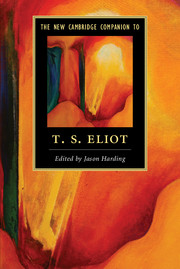Book contents
- Frontmatter
- Contents
- Notes on contributors
- Preface
- Chronology of Eliot's life and works
- List of abbreviations
- 1 Unravelling Eliot
- 2 Eliot: Form and Allusion
- 3 Prufrock and Other Observations
- 4 Banishing the Backward Devils: Eliot's Quatrain Poems and “Gerontion”
- 5 With Automatic Hand: The Waste Land
- 6 “Let These Words Answer”: Ash-Wednesday and the Ariel Poems
- 7 Four Quartets
- 8 “A Precise Way of Thinking and Feeling”: Eliot and Verse Drama 116
- 9 T. S. Eliot as Literary Critic
- 10 T. S. Eliot's Social Criticism
- 11 Gender and Sexuality
- 12 Eliot's Philosophical Studies: Bergson, Frazer, Bradley
- 13 “Anglo-Catholic in Religion”: T. S. Eliot and Christianity
- Select bibliography
- Index
- Miscellaneous Endmatter
9 - T. S. Eliot as Literary Critic
Published online by Cambridge University Press: 01 December 2016
- Frontmatter
- Contents
- Notes on contributors
- Preface
- Chronology of Eliot's life and works
- List of abbreviations
- 1 Unravelling Eliot
- 2 Eliot: Form and Allusion
- 3 Prufrock and Other Observations
- 4 Banishing the Backward Devils: Eliot's Quatrain Poems and “Gerontion”
- 5 With Automatic Hand: The Waste Land
- 6 “Let These Words Answer”: Ash-Wednesday and the Ariel Poems
- 7 Four Quartets
- 8 “A Precise Way of Thinking and Feeling”: Eliot and Verse Drama 116
- 9 T. S. Eliot as Literary Critic
- 10 T. S. Eliot's Social Criticism
- 11 Gender and Sexuality
- 12 Eliot's Philosophical Studies: Bergson, Frazer, Bradley
- 13 “Anglo-Catholic in Religion”: T. S. Eliot and Christianity
- Select bibliography
- Index
- Miscellaneous Endmatter
Summary
Who can doubt that Criticism, as well as Poetry, can have wings?
This epigraph is not by T. S. Eliot, nor is it something he could have written. Nor, for all the imaginative brilliance of his work in both forms, criticism and poetry, is it a phrase we would be likely to encounter about Eliot. It is instead the epigraph to J. E. Spingarn's Creative Criticism, which Eliot reviewed for the TLS in 1926. Eliot, whose critical eye was often drawn to fragmentary forms such as epigraphs, quotes these words, enjoying the borrowed flight of whimsy, but then adds a stern coda. Spingarn's criticism, he writes, undeniably does have “wings”; alas, “like the fabulous bird of paradise, it has wings but no feet, and can never settle” (CP2 805). Literary criticism, for Eliot, might launch, then soar. Nonetheless, it should have firm foundations: tradition, order, precision, and criteria. In the year of this review, Eliot had just emerged from the pseudonym, Crites, champion of the ancients, under which he had written his regular editorial “Commentaries” for the Criterion. Spingarn's fancifulness earns him a place in the ranks of the “Imperfect Critics” that Eliot began to assemble from his earliest ventures into literary judgment, granting this title to the second chapter of The Sacred Wood: Essays on Poetry and Criticism (1920). His first chapter in this book addresses the more singular (perhaps, by implication, near-mythical) case of “The Perfect Critic”: the quest both to delineate and to become this figure gives form to Eliot's prose.
To begin with unattributed words that do not belong to their apparent subject – in fact, that illustrate something that their subject would not have said – was one of the most characteristic tactics of Eliot's own criticism. Lecturing on Matthew Arnold, for example, in the series The Use of Poetry and The Use of Criticism (1933), Eliot opens with a long quotation from an authoritative nineteenth-century voice, urging “a new discipline of suffering to fit men for the new conditions.” Arnold's vision for civilization, the audience might presume, only to be told: “these words are not only not Arnold's, but we know at once that they could not have been written by him” (CP4 654, italics added).
- Type
- Chapter
- Information
- The New Cambridge Companion to T. S. Eliot , pp. 131 - 144Publisher: Cambridge University PressPrint publication year: 2016



